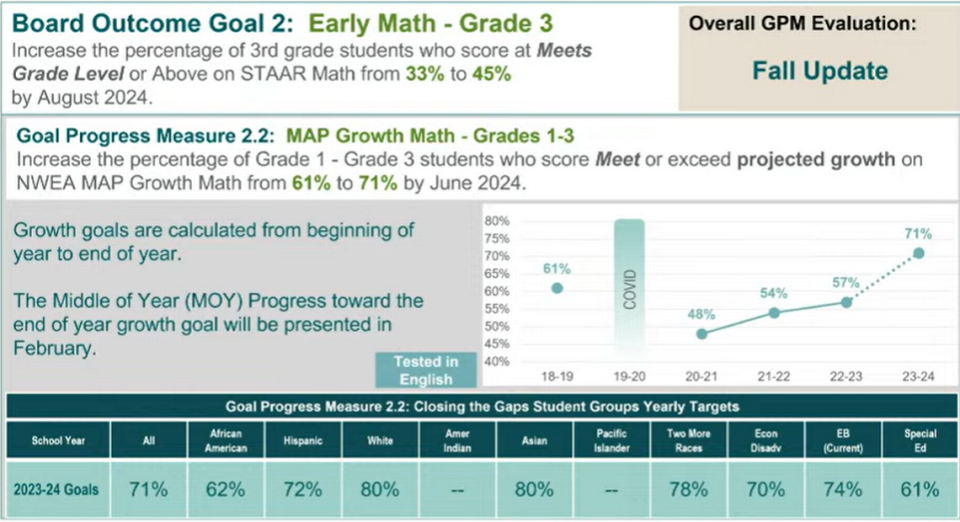Math scores rise for Fort Worth ISD’s 1st, 2nd and 3rd graders, but improvement needed
- Oops!Something went wrong.Please try again later.
First through third grade students in the Fort Worth Independent School District saw slight improvements in math testing from last school year, but they’re still trailing behind their peers across the U.S., according to data presented to school board members on Tuesday.
Scores from Measures of Academic Progress tests, also known as MAP, that were administered at the beginning of the school year showed that the average achievement level of all students in first through third grade this fall compared to fall 2022 increased by 2%, according to Diane Lopez-Martinez, the district’s executive director of math and science. The test is given three times a year to show student progress over time.
When looking at demographics such as race, ethnicity and special education, across the three grades, each group saw minor increases of up to 2%, except for African American students who saw no increase, data shows. First graders, second graders and third graders in the Fort Worth ISD were 4 to 8 points behind the “national norm.”
“The national norm is derived from a very large sample of students who have taken the MAP assessment. NWEA (Northwest Evaluation Association) uses this data to inform how students are performing across the nation,” Lopez-Martinez said. “When our students take the MAP assessment, their scores are compared to the national norm at that point in time to determine performance relative to their peers nationally.”
Board member Anael Luebanos noted that keeping a pace of a one-point increase for both second grade and third grade, seen from last school year to now, would not be fast enough to catch up to the national scale.
“One point is not enough for us. We are not satisfied with that,” replied Charles Garcia, an associate superintendent for learning and leading. “We still have middle of the year and end of the year (tests) to get those gains and those gaps, but I agree. I think we want to shoot for the stars, and our kids deserve the best. We want to see a higher percentage of increase there.”
Moreover, first grade through third grade students who met or exceeded projected growth in math on the MAP test increased from 48% during the 2020-2021 school year to 57% during the 2022-2023 school year. The goal is to reach 71% by June.

District officials outlined goals for student improvement that they want to reach within the next year for MAP tests and other assessments, spanning from pre-K to third grade. The starting percentage comes from the 2018-2019 school year, before the COVID-19 pandemic hit, unless noted otherwise:
Increase the percentage of pre-K students who score “on track” in math on the CIRCLE assessment from 87% to 88% by June
Increase percentage of kindergartners who meet or exceeded projected growth in math on the MAP test from 37% during the 2020-2021 school year to 46% by June
Increase the percentage of first to third grade students who meet or exceed projected growth in math on the MAP test from 61% to 71% by June
Officials also outlined a goal of increasing the percentage of third graders who meet grade level or above in math on the STAAR, or State of Texas Assessments of Academic Readiness exam, from 33% to 45% by next August.
“We understand in order for those student outcomes to change and improve, we got to push into our human capital… We want to ensure that we are mobilizing to support our teachers so that they can plan effectively, but also utilize the high-quality instructional materials with an understanding of the standards and the TEKS (Texas Essential Knowledge and Skills),” Garcia said, referencing the state standards of what students should know across various subjects.
Alexandra Montes, principal of Versia Williams Elementary, said the school conducts weekly planning meetings where teachers collaborate to improve student outcomes through planning and data-driven instruction. Students are also tracking their academic progress by setting goals with their teachers and parents.
“Monitoring student progress on a regular basis also enables our campus, teachers, students and parents to analyze a student’s current performance level, as well as taking ownership of their learning,” Montes told board members. “They hold themselves accountable to do better and seem to be more confident learners.”
Hollie Plemons, who identifies herself as a Fort Worth ISD taxpayer, called the presented MAP test results “not acceptable” during public comment and noted the DreamBox Learning curriculum as an example of a waste of money.
“If you actually want our kids to improve, you’re going to change things,” Plemons said.

